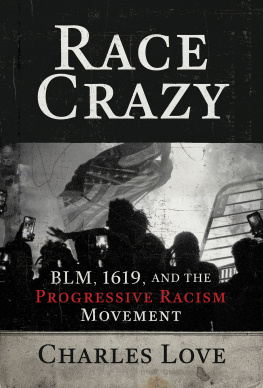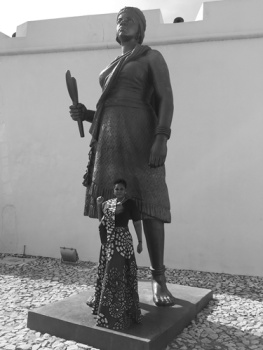Library of Congress Cataloging in Publication Data
Boles, John B., 1943-
Black southerners, 1619-1869.
(New perspectives on the South)
Bibliography: p.
Includes index.
1. SlaverySouthern StatesHistory, 2. Afro-AmericansSouthern StatesHistory. 3. Southern StatesHistory. 4. Southern StatesRace relations. 5. Plantation lifeSouthern StatesHistory. I. Title. II. Series. E441.B67 1983 975'.00496073 83-10177
ISBN: 0-8131-0303-7 cloth; -0161-1 paper
Copyright 1984 by The University Press of Kentucky
Scholarly publisher for the Commonwealth, serving Bellarmine College, Berea College, Centre College of Kentucky, Eastern Kentucky University, The Filson Club, Georgetown College, Kentucky Historical Society, Kentucky State University, Morehead State University, Murray State University, Northern Kentucky University, Transylvania University, University of Kentucky, University of Louisville, and Western Kentucky University.
Editorial and Sales Offices: Lexington, Kentucky 40506-0024
Editors Preface
Of all the institutions and practices that have contributed to the distinctiveness of the South, slavery is the most clearly identifiable. It is the one thing that, beyond question, distinguished the Old South legally, socially, culturally, psychologically, and symbolically from the rest of the country. Its effects have persisted in countless ways to the present day.
John Boles has produced an able and balanced account of southern slavery, its destruction in the Civil War, and its immediate aftermath during Reconstruction. He has wisely avoided making the slaves into angels or supermen, or the owners into demons or monsters. Instead, he has drawn upon a wealth of recent scholarship to show that the relations between masters and chattels were such that the blacks were able to retain both their humanity and significant elements of their African heritage, thus preserving the core of a black community within the embrace of the dominant white society.
Because the story of slavery is central to that of the region, and because of the authors knowledge and insights, this work is an essential volume in New Perspectives on the South. The series is designed to give a fresh and comprehensive view of the Souths history, as seen in the light of the striking developments it has undergone since World War II. Each volume is expected to be a complete essay representing both a synthesis of the best research on the topic and an interpretive analysis derived from the authors own reflections. Twenty or more volumes are planned.
CHARLES P. ROLAND
Preface
Some years ago, having already written a book on the religion of antebellum white southerners, I was asked to write one on religion in Kentucky before the Civil War. In the course of preparing that volume, I realized the need for a chapter on the faith of black people, and hence I was drawn to a fascinating topic of immense complexity. Subsequently I decided to make a major study of slave religion. But as I began to read about religion, I found I had to enlarge my focus to include all of black culture. Soon my reading forced me to consider topics as varied as the rise and influence of the black family and the nature of the antebellum economy. Almost before I realized it, my narrow, manageable topic grew to include the total black experience, from the African background through Reconstruction.
I wanted to emphasize how the institution of slavery changed over time, and I wanted to show the diversity of the antebellum black experienceurban and industrial as well as agricultural slaveryand the development of the free black population. I came to see that one must know the seventeenth- and eighteenth-century background to understand slavery at its height, 1820-60, and that the way slavery ended and evolved into sharecropping after the Civil War illuminated the prewar experience. While I have tried in the present book to discuss a wide range of topics, no one is more aware than I of how much I have left unsaid. I wanted to compress as much of the history of black southerners as I could into relatively few pages, making accessible to readers the fruit of the remarkably rich scholarship on blacks that has appeared during the last two decades.
Writing is just another way of teaching, the major difference being that the students are not sitting in the room with the writer as they are with the classroom teacher. The teacher, having read the literature on a topic that has captivated him, tries to distill the work of others, synthesize it, and present it in as interesting and comprehensible a format as possible. This is what I try to do in this book.
Anyone teaching or talking about slavery is faced with an unusual problem. The scholarship on the subject has been so extensive, and of such high quality, that one does not know which books to assign, or rather, not to assign. This embarrassment of riches is further complicated by the chronological and topical limits of most of the work. There are marvelous books on colonial slavery, on mid-nineteenth-century slavery, on industrial and urban slaves, on free blacks, and on slave religion, but there exists no one brief, interpretative volume that attempts to include all these subjects. This book is offered as a distillation of a distinguished body of scholarship, a synthesis that is more than a summary, more than an introduction. I hope it will lead others to read the books and articles upon which it is based.
My title, of course, makes the point that blacks have been southerners for almost as long as whites have. Indeed, neither the South nor white southerners can be understood without taking into consideration the experience and contributions of those other southerners, the blacks. The South is the blacks land too, and many of them identify with it and love it. Properly speaking, southerner is a biracial term. The blacks passage toward freedom has been long and arduous, and to a profound degree their experience in the New World constitutes a Middle Passage writ large. With roots in Africa, involuntarily brought to America, they were to find liberty only after two and a half centuries of bondage. Even then, the freedom of the freedmen was circumscribed by habit and racism. Their story consists of equal parts of tragedy and courage but ultimately proclaims that the human spirit is unquenchable.
A number of individuals have assisted me in preparing this book, which has preoccupied me during much of my tenure at three different universities. In addition to the students in my graduate seminars at Towson State, Tulane, and Rice, I would like to thank the following persons, who read the manuscript in various drafts and made helpful suggestions: Cathy M. Azzi, Charles B. Dew, Irma F. Garlick, Michele K. Gillespie, Thomas L. Haskell, Sanford W. Higginbotham, Allen J. Matusow, Evelyn T. Nolen, Lawrence N. Powell, and Bennett H. Wall. While none of them may be completely satisfied with the final result, I know how much the manuscript profited from their efforts. Of course, I am ultimately responsible for the views and interpretations contained herein, and I absolve them from any possible blame. Elizabeth H. Turner helped with checking the bibliography and proofreading. A series of secretaries have typed versions of the manuscript: Valeria Palo, Elaine Severio, Kelly Kane, Darlene U. Collins, and Kathy Tomasic-Carrazedo. Linda Quaidy rescued me from one major typing emergency. To all of them, thanks.











